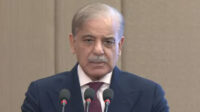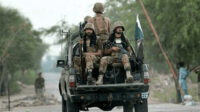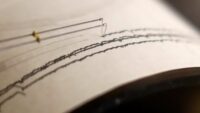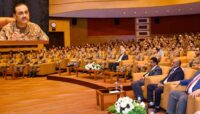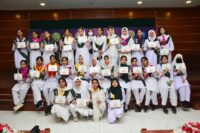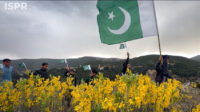The first General Cemal Gursel led military coup in 1960 came about with Adnan Menderes as Turkey’s first democratically appointed Prime Minister. He had served in Mustafa Kemal’s army but toppled his party in the elections. Adnan Menderes, along with President Celal Bayar, loosened some Kemalist edicts like legalizing the azaan in Arabic from the Kemalist Turkish. Many mosques were reopened and military service tenure was decreased. Infuriated, the military took over, General Cemal Gursel becoming both president and prime minister.
The deposed Adnan Menderes was arrested along with President Bayar, Foreign Minister Fatin Rustu Zorlu and Finance Minister Hasan Polatkan; all were sentenced to death. President Bayar’s sentence was commuted to imprisonment because of his age; Adnan Menderes and his two cabinet colleagues were executed. The brutal message was that the Kemalist military would never allow religious expression of any sort whatsoever in a secular Turkey.
These were oppressive times in Turkey. It can be gauged from the fact that Turkish coups fostered instability with eleven prime ministers being changed within a span of nine years after the 1971 coup. The economy nose-dived as violent clashes saw thousands perish.
In 1997, during Prime Minister Necmettin Erbakan’s government, the military forced enforcements included a compulsory eight-year education program to prevent children from going to religious schools and a ban on women wearing headscarves. In 1998, after less than a year in office, Erbakan was forced to resign and his governing Welfare party was banned.
Gradually, pent-up sentiments repressed by years of Kemalism started emerging as the Turkish nation started removing the yoke of secularism with a trek back to its Islamic identity with admirable resolve and vigor.
This journey saw Recep Tayyip Erdogan, a pupil of Necmettin Erbakan, who along with others would find the present ruling Justice and Development Party, elected in 1994 as mayor of Istanbul. The once glorious Constantinople was now Istanbul, a poor decaying capital city. Erdogan solved the two perennial problems faced by the residents; he gave Istanbul freshwater supply and had the streets cleared of trash and dumped garbage.
In 1999, during a passionate speech, Erdogan recited a famous Ziya Gokalp poem which had the verses: “The minarets are our spears, the domes our helmets, mosques our barracks, the faithful our soldiers, Allah u Akbar Allah u Akbar”. This gave the Kemalist military jitters and Erdogan was sentenced to 11 months in prison. Thousands of Turks accompanied Erdogan to the western Thrace prison where Erdogan would remain a prisoner for four months.
After decades of Kemalism, Turkey took another significant step towards its roots as The Justice and Development Party (AKP) that sprang from the Islamic political movements of the 1990s won an outright majority in the 2002 elections. This reflected the will of the people despite decades of state-imposed Kemalism. It can also be well gauged from the fact that AKP occupied the posts of President – Dr. Abdullah Gul, Prime Minister – Recep Tayyip Erdogan and Parliamentary Speaker – Koksal Toptan.
The AKP has been in power since 2002, a testament to the faith the Turkish people repose in the enigmatic personality of President Recep Tayyip Erdogan. The AKP has bettered its standing with each election, a remarkable feat. It is also indicative of the country’s growing prosperity and better social services, particularly in health-care and housing. Turkey has thousands of AKP initiated small and medium-sized export-oriented businesses; they are dubbed the Anatolian Tigers.
The Turkish economy grew by a healthy average of 7.5 percent annually between 2002 and 2011. Low interest rates and inflation revitalized the stagnated economy. A transparent privatization program and economic environment attracted foreign investment which surged from 15 billion dollars in 2003 to 209 billion dollars till 2018. The average per-capita income rose from 2,800 dollars in 2002 to 27,640 dollars in 2018.
The increasingly sidelined Turkish generals, seeing their eroding hold, posted a statement on the military’s website on April 27, 2007 warning that “if necessary, the Turkish Armed Forces will not hesitate to make their position and stance abundantly clear as the absolute defenders of secularism”.
In a defining moment, the likes of which set the course for nations, Prime Minister Erdogan, instead of being cowed down, called for a snap election. The people, in a stinging rebuke to the military and Kemalism, handed the AKP a landslide victory. When the AKP won its third consecutive election in 2011 with 49.90 percent of votes, the military having received the message from the people saw General Isik Kosaner, Turkish armed forces chief, resign. President Abdullah Gul appointed General Necdet Ozel as the new army chief.
Other senior officers, including the army, navy and air-force chiefs, also resigned after a court charged 22 suspects, including several generals and officers, with carrying out a campaign to undermine the government. This was a continuation of actions against those involved in the ‘Sledgehammer’ controversy, a coup plan presented at an army seminar. Seventeen army generals and admirals were among the more than 200 officers charged with the Sledgehammer conspiracy and handed out prison sentences. It was a herculean shift for a country that had experienced brutal coups and constant military purges for almost a century.
Mustafa Kemal once said: “the Turkish government rules for the people, despite the people”. Two events which may have seen the last vestiges of this Kemalism, that was the elimination of Turkey’s religious heritage, confined to the annals of history like the Byzantine Empire were the 2016 coup attempt and the decision to revert Hagia Sophia to the Aya Sofya.
On 15 July 2016, some elements within the Turkish military, in a bid to topple the government of President Erdogan, launched operations in several major Turkish cities. The Chairman of the Joint Chiefs of Staff, General Hulusi Akar, was detained by his own security detail as fighter jets bombed the Turkish parliament. President Erdogan was in Marmaris (Turkish coastal town) when the coup attempt started. President Erdogan later said, “The hotel I was staying in was bombed, my secretary was arrested after I left” and that “F-16 jets tried to force-land my plane”.
Before the social-media could be restricted, Presiden Erdogan phoned into a Turkish TV network via FaceTime from a secure location and addressed the people appealing: “Honorable Turkish nation, claim democracy and peace: I am calling you to the streets against this action of a narrow cadre that has fallen against the Turkish nation. Claim the state, claim the nation”’.
The Turkish nation responded en masse to the call as millions, across the political divide, swarmed into the streets of Istanbul and other major cities. In a matter of hours the unarmed people forced the coup perpetrators into submission; 265 people lost their lives, over 2000 were wounded. When President Erdogan landed at Islamabad airport, he was received by thousands of jubilant Turks. The coup attempt was blamed on elements loyal to Fethullah Gulen, who lives in self-imposed exile in the United States.
Subsequently, 20226 of those involved in the coup attempt including 26 generals were charged. 3,239 were convicted with 1935 getting life sentences; 86 got aggravated life sentences – life in prison without parole. 4000 members of the judiciary, 31000 of the police and 15,000 from the military were sacked.
The second epoch-making event was the decision by the top Turkish court to revert Hagia Sophia back to a mosque. On 10 July, 2020, Turkey’s highest administrative court, the council of state, unanimously ruled to annul the 1934 Kemalist cabinet decree that had converted the Aya Sofya into a museum. President Erdogan signed a presidential decree immediately after the judgment; Hagia Sophia museum, once again, became Aya Sofya, the mosque.
Stay tuned to Baaghi TV for more. Download our app for the latest news, updates & interesting content!

